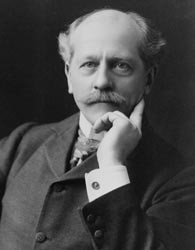A naturally gifted mathematician, Percival Lowell shunned convention to pursue theories that walked the line between science fiction and scientific prophecy. He was compelled to explore uncharted territory, whether it be the Far East or outer space. The first to suggest life on Mars and the existence of a ninth planet, Lowell inspired researchers and writers for generations to come.
Percival Lowell’s Early Days
Born into a wealthy literary family in Boston, Percival Lowell had a privileged upbringing. At Harvard, Lowell proved himself to be a gifted academic, excelling both in history and mathematics. The Boston Globe writes that many people thought he was “the most brilliant young man in Boston.”
He gave a highly advanced speech at his graduation on the subject of “The Nebular Hypothesis,” but he would not actively pursue any education beyond the undergraduate level. He did ultimately acquire honorary degrees from Amherst College and Clark University. After the usual post-graduation tour of Europe, Lowell initially tried his hand at business, but gave it up in 1883 to head to the far east, where he began writing and exploring. He wrote a few books about his experiences in Asia.
In 1893, he decided to pick up the work of Italian astronomer Giovanni Schiaparelli. Lowell had had a passion for the sky since he was a young boy with a telescope on the roof of his family home, and he would now make astronomy his life work.
Sources in this Story
- The Boston Globe: The Man Who Invented Mars
- The Lowell Research Center
- The Planetary Society: The Discovery of a Planet
- Encyclopedia Britannica: Percival Lowell
- Phoenix Mars Mission: Bright Chunks At Phoenix Lander’s Mars Site Must Have Been Ice
- findingDulcinea: On This Day: The War of The Worlds Broadcast Causes Panic
Lowell’s Notable Accomplishments
Lowell was the first to suggest that there might be life on Mars. Schiaparelli claimed to have discovered canals on the surface of Mars, and Lowell thought the canals were the irrigation system used by extraterrestrials to farm on Mars. He established the Lowell Observatory in Flagstaff, Arizona, and settled down to watch the Red Planet.
One of Lowell’s more famous books is “Mars and Its Canals.” It explains his theory about how the polar ice caps on Mars melted and the water spread across the planet via the canals.
Lowell was a gifted and prolific writer, although his works appealed more to the imagination than to hard science. What Lowell lacked in credibility, he made up for with charm, and he managed to circulate his theories about Mars widely. But other scientists simply didn’t see the canals, and to save his reputation, Lowell began working on other projects. Lowell examined certain irregularities in the orbit of Uranus, analyzed them mathematically and theorized that they were caused by a planet beyond Neptune. He devoted his time to looking for the ninth planet, which he called Planet X.
Learn more about the dwarf planet Pluto, previously regarded as our ninth planet.
The Man and His Work
- “The Soul of the Far East”
- “Mars and Its Canals”
- “Occult Japan; or, The Way of The Gods”
- “Percival Lowell: The Culture and Science of a Boston Brahmin” by David Strauss
The Rest of the Story
Lowell died on November 12, 1916. Although Lowell’s theory regarding Neptune’s orbit perturbations was incorrect, it was at his own Lowell Observatory that astronomer Clyde Tombaugh confirmed the existence of a ninth planet in 1930; the planet was named Pluto (now reclassified as a “dwarf planet”).
Lowell’s much-contested theories about Mars were also proved false in 1965 with data collected by U.S. spacecraft Mariner 4. Although there is currently no definitive evidence that complex life existed on Mars, more recent unmanned expeditions do indicate there may be water on Mars.
Recently the search for extraterrestrial water has focused on the moon, with findings showing that there are in face water molecules on the lunar surface. Learn what water on the moon will mean for the future of space exploration.
Lowell also inspired somewhat less scientific endeavors. His theories about life on Mars are thought to have been the inspiration for H.G. Wells’ 1898 novel “The War of the Worlds.”
The Lowell Observatory is now a nonprofit organization, committed to research and educating the public about astronomy.
This article was originally written by Rachel Balik; it was updated January 23, 2017.











